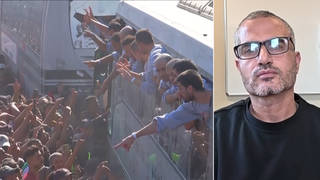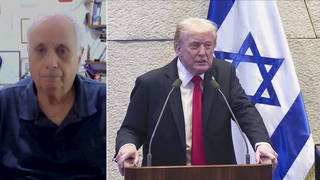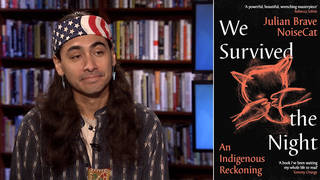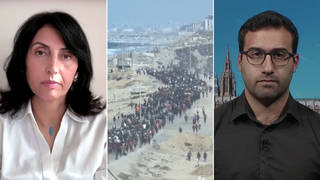
Topics
The final Democratic Presidential debate of the year was held in Iowa on Thursday. We play highlights of the debate, including Governor Bill Richardson’s admission that he made some mistakes in the handling of the case of Wen Ho Lee while serving as President Clinton’s energy secretary. Lee is the nuclear scientist who was falsely accused by the Clinton administration of spying for the Chinese government. [includes rush transcript]
Transcript
AMY GOODMAN: We turn now to the last Democratic debate. It’s just weeks before the Iowa caucuses, January 3. The last debate in Iowa took place on Thursday, organized by the Iowa newspaper The Des Moines Register
and included only six candidates. Dennis Kucinich and Mike Gravel were not invited.
Although none of the candidates attacked each other, there were some sharp questions from the host Carolyn Washburn to each of the candidates, beginning with Senator Hillary Clinton.
CAROLYN WASHBURN: Senator Clinton, during your time as First Lady, there were criticisms that your process to develop your healthcare plan was too closed and secretive. Some Iowans we hear from are worried that your presidency would operate the same way. As president, how would you ensure that your administration doesn’t withhold information from the public, even if it gave ammunition to your critics.
SEN. HILLARY CLINTON: Well, I learned a lot from that experience, and clearly, one of the principal lessons is that you have to have a very strong communications strategy, and we didn’t do that. And I have certainly learned from that during the remaining years in the White House, when I helped to create the Children’s Health Insurance Program and did a lot of other work with the Clinton administration and, of course, now in the Senate.
I want to have an open and transparent government. I have put forth very specific plans for how I would reform the government, put as much as we can on the internet. Now we’ve got this tool; let’s use it. Let’s have as much sunlight as we possibly can gather. Let’s also make sure that we have an administration that works with the Congress, instead of stonewalling and denying legitimate requests for information and witness testimony and all the rest that this administration unfortunately has done. I think it’s also very important that we end the revolving door of lobbyists, that we move toward public financing. I’ve signed on to Russ Feingold’s bill, because I think it is the best piece of legislation to try to make those changes. So I’m very committed to open, transparent government, and I’ve learned a lot, and I think I can apply those lessons.
CAROLYN WASHBURN: Thank you. Senator Biden, you, in your campaign, have had a number of occasions to correct or clarify things you said relating to race, including your remarks about Senator Obama being, quote, “clean and articulate,” your comment about Indians working at 7-11, and recently to the Washington Post, in which you spoke about race while describing disparities between schools in Washington, D.C. and Iowa. Do these gaps or misunderstandings, or however you would characterize them, indicate you’re uncomfortable talking about race, or are people just being too sensitive?
SEN. JOSEPH BIDEN: I think that I have my whole career — I got involved in public policy, I got involved in politics because of the Civil Rights Movement. It’s the overwhelming core of my support in my home state. I get the overwhelming majority, over 95% of the vote of minorities in my state.
I may have phrased those things wrongly, but when I talked about the Indian population, what I was making the point was they’re building families. They’re coming by in businesses, 7-11s and Dunkin’ Donuts and small shops, just like those Italian immigrants used to do, and they’re building families.
The point I was making about the inner city of Washington is the point that Barack just made. Barack made the point. He said that minorities start off at a disadvantage. They start off with a gap, an achievement gap that exists before they even walk into school, minorities. And so, I was making the same point.
It may be possible, because I speak so bluntly, that people misunderstand, but no one who knows me in my state, no one who I’ve worked with in the United States Congress has ever wondered about my commitment to civil rights and civil liberties. And if you take a look at my record as chairman of the Foreign Relations Committee — excuse me, of the Judiciary Committee, ranking member, chairman for sixteen years, it started with the Voting Rights Act and worked its way through to voting against constitutional amendments on busing when busing was taking place in my state. My credentials are as good as anyone who has ever run for president of the United States on civil rights.
CAROLYN WASHBURN: Senator Obama?
SEN. BARACK OBAMA: I just wanted to — I just want to make the comment, I have worked with Joe Biden. I have seen his leadership. I have absolutely no doubt about what is in his heart and the commitment that he has made with respect to racial equality in this country. So I will provide some testimony, as they say in church, that Joe is on the right side of the issues and is fighting every day for a better America.
CAROLYN WASHBURN: Thank you. Senator Edwards, you’ve talked a lot about reducing the power of wealth and special interests in the country, the same groups often responsible for getting things done in Washington, too. How will you accomplish your agenda after spending a lot of months calling these groups corrupt?
JOHN EDWARDS: Well, here’s what I believe. What I believe is that there are very well financed insurance companies, drug companies, oil companies. Some people argue that we’re going to sit at a table with these people, and they’re going to voluntarily give their power away. I think it is a complete fantasy. It will never happen. I don’t think anybody in America wants to see politicians fighting with each other, but I think they understand that we have an epic battle in front of us to do what needs to be done for all the American people.
All the things that we’ve talked about today — healthcare, attacking global warming, doing something about a tax policy that favors big corporations and the richest Americans, doing something about our trade policy — every single one of those things depends on winning this battle. We cannot do it if we don’t win this battle. And all I would say is, I’ve been fighting these people, big corporations, for twenty years in courtrooms and then in public life. I have been fighting them my entire life, and I have been winning my entire life. And if you want a fighter, to voters, to caucus goers, you’re looking at somebody — I’m fifty-four years old — who has spent his entire life engaged in this fight and winning this fight that we must win to be able to do the things that we want to do for this country.
CAROLYN WASHBURN: Thank you. Senator Dodd, you wrote in your book that you still struggle with the memories of when your father, former Senator Thomas Dodd, was censured by the Senate in 1967 for alleged misuse of campaign money. How much are you motivated in your run for president by a desire to restore the Dodd family name that was hurt by the censure?
SEN. CHRISTOPHER DODD: I’m motivated by my family because of their public service. About a week or two before my father passed away some forty years ago, he was asked by a reporter, Carolyn, if he would do it all over again, in light of his lost election and what had happened to him. And I remember sitting in that room and hearing his answer that day. He said he’d do it again in a minute. He started the first National Youth Administration in my home state of Connecticut in 1933 as part of Franklin Roosevelt’s New Deal. He said there’s no other calling in life where you can do as much for as many people as you can through public service. Lawyers only have so many clients; doctors only have so many patients. But a well-intentioned public servant can make a difference in the lives of millions of people. That’s my motivation. I want to carry that tradition on. That’s why I’m running for president.
CAROLYN WASHBURN: Senator Obama, you have Bill Clinton’s former national security adviser, State Department policy director, and Navy secretary, among others, advising you. With relatively little foreign-policy experience of your own, how will you rely on so many Clinton advisers and still deliver the kind of break from the past that you’re promising voters?
SEN. BARACK OBAMA: Well, the — you know, I am —-
SEN. HILLARY CLINTON: I want to hear that.
SEN. BARACK OBAMA: Well, Hillary, I’m looking forward to you advising me, as well. I want to gather up talent from everywhere.
You know, we haven’t talked too much about the war, but one of the points that I’ve tried to make during the course of this year during the campaign is I want to change the mindset that got us into war, because I think that since 9/11, we’ve had a president who essentially fed us a politics of fear and distorted our foreign policy in profound ways. And I think that there are a lot of good people in the Clinton years, the Carter years, George Bush I, who understand that our military power is just one component of our power. And I revere what our military does, and I will do whatever it takes as commander-in-chief to keep the American people safe, but I know that part of making us safe is restoring our respect in the world. And I think those who are advising me agree with that, and part of the agenda that we’re putting forward, in terms of talking not just to our friends, but also to our enemies, initiating contacts with Muslim leaders around the world, doubling our efforts in terms of foreign aid -— all those are designed to create long-term security by creating long-term prosperity around the world.
CAROLYN WASHBURN: Governor Richardson, you promote your experience as Energy Secretary among your credentials. During that time, though, there were serious questions about lax security at the country’s national labs, allegations that scientist Wen Ho Lee breached security at Los Alamos. You told Tim Russert in May, “We had some issues with the nuclear secrets issue and Wen Ho Lee, but I think, on the whole, I was a good Energy Secretary.” In this era when Americans are fearful about our national security, talk about that part of your resume.
GOV. BILL RICHARDSON: Well, and I will add that in twenty-five years in public service, there are probably many more other mistakes that I’ve made, but I want to say to you that when it was with Wen Ho Lee, this was the issue of protecting our nuclear secrets. And he did plead guilty. I do feel that he was incarcerated in solitary confinement — this was wrong. I tried to change it, but I didn’t work hard enough. The point is that we do have in all of our lives — as a congressman, as a UN ambassador, as a candidate, I’ve made a lot of gaps, and I’m glad you didn’t raise them. But, you know, I’ll stand behind my record as Energy Secretary. I brought compensation to workers that had beryllium and other contamination. I brought forth a renewable portfolio standard, the first one that says electricity has to be renewable in this country. We made air-conditioning 30% more energy-efficient. And there are some cases in the Wen Ho Lee, where I wish I had been stronger, but I don’t apologize for trying to protect our nuclear secrets, and we should have done a lot more.
AMY GOODMAN: Some of Thursday’s Democratic presidential debate. That clip ended with New Mexico Governor Bill Richardson admitting he made some mistakes in the handling of the case of Wen Ho Lee, who was the nuclear scientist at Los Alamos of Chinese descent, falsely accused by the Clinton administration of spying for the Chinese government. As President Clinton’s Energy Secretary, Bill Richardson fired Wen Ho Lee, who was then arrested, indicted on fifty-nine counts, threatened with execution. He was held for 278 days in solitary confinement. Within a year, the government dropped fifty-eight of the fifty-nine charges. And a federal judge then ordered Wen Ho Lee’s release. In an unusual statement from the bench, he rebuked the government, apologized to Wen Ho Lee. Last year, the government agreed to pay him nearly $900,000 for violating his right to privacy by leaking information to the press.
When we interviewed Governor Richardson in September 2005 in Santa Fe, he was far less conciliatory about his handling of Wen Ho Lee’s case. I spoke with Governor Richardson at a studio in Santa Fe, New Mexico. At that time, he said, quote, he stands by everything he said and did in the case.
GOV. BILL RICHARDSON: This was a man that was convicted on several counts of tampering with classified information, so —
AMY GOODMAN: But the minorest of counts. I mean, what he was originally -–
GOV. BILL RICHARDSON: Well, no, it was not minor. This is where you’re wrong. It was not minor. There were very sensitive nuclear secrets that possibly were compromised and were improperly taken from his computer. Now, the judgment of the judge, I believe, is speculative. But I stand behind the very strong actions that I took to protect our nuclear secrets.
AMY GOODMAN: So, you say the federal judge is wrong in saying that you are the probable source of the leaks?
GOV. BILL RICHARDSON: Absolutely. He’s totally wrong.
AMY GOODMAN: I mean, in the case of Wen Ho Lee, though, originally they said he could be a reason for the possible — well, like President Bush used in the argument for the Iraq war, he could be the source of a nuclear explosion, a bombing of the United States. And ultimately, when the judge freed Wen Ho Lee, he said he had been egregiously misled by government officials about what Wen Ho Lee was responsible for. And he was irate. He was enraged, the judge, I mean.
GOV. BILL RICHARDSON: Well, that’s his opinion. I believe that we acted properly in safeguarding our nuclear secrets. He was convicted on several counts. There were some mistakes in that case. It involved the entire federal government, and I stand behind everything that I did.
AMY GOODMAN: Gov. Bill Richardson. That was September 2005.











Media Options